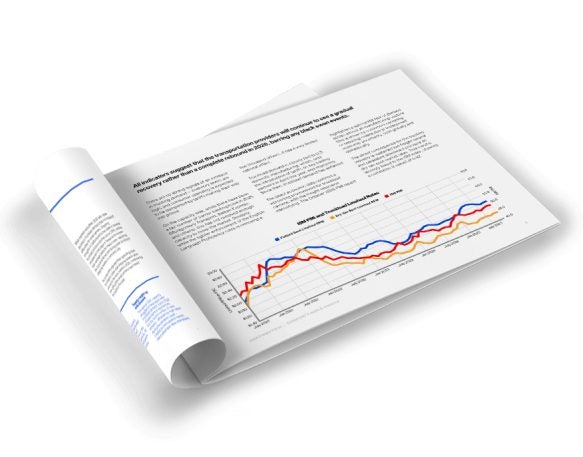For companies that rely on the transportation of goods, it’s essential to understand the intricacies of data and analytics to make informed decisions. In this guide, we’ll set the stage for a deeper exploration of how big data, freight intelligence, and advanced transportation metrics can revolutionize your approach to shipping analytics. By unlocking the potential of 360-degree views of the freight market, businesses can gain a profound understanding of the industry’s complexities, enabling them to make data-driven decisions and enhance transportation KPIs for optimized shipping efficiency.
We will not only go over the importance of these reliable insights but also introduce the concept of transportation and logistics analytics, highlighting the potential impact of transportation intelligence on organizations. We’ll explore the transformative power of big data and its application in the shipping industry, specifically in freight rate data, transportation capacity analytics, and transportation rate benchmarks. Discover how harnessing these transportation rate performance metrics can empower your organization, revolutionize your logistics game, and ultimately elevate your shipping operations to new heights. Throughout this article, we will delve into transportation market data, freight analytics, and transportation rate forecasts, offering insights into transportation rate prediction and truckload rate analytics that can shape the future of your logistics strategy.
The power of big data in freight logistics
The role of big data has evolved to become a game changer for organizations seeking to gain a competitive edge in today’s fast-paced transportation landscape. But what exactly is big data in the context of the shipping industry? Big data encompasses the vast and varied sources of information available within the transportation and logistics sector, including transportation and freight market data, transportation rates data, and transportation capacity analytics. It extends to encompass an intricate web of data points, comprising freight market intelligence, transportation metrics, and more.
The true power of big data lies in its ability to provide organizations with a comprehensive and real-time understanding of the logistics landscape. Through advanced transportation analytics, businesses can make data-driven decisions, improving transportation rate performance, and optimizing their shipping operations. This data-driven approach marks a significant shift from traditional practices, where decision-making relied heavily on past experiences and intuition.
The potential benefits of harnessing big data in freight logistics are multifaceted. It allows organizations to enhance transportation and logistics analytics, helping them identify patterns, trends, and correlations that might otherwise remain hidden. By leveraging this wealth of information, companies can make more accurate transportation rate forecasts and predictions, leading to better transportation rate and capacity analytics.
Big data also empowers shippers to fine-tune their transportation rate benchmarks, monitor transportation capacity forecasts, and evaluate logistics performance analytics. With access to real-time data and transportation rate performance metrics, organizations can respond swiftly to market changes, optimizing transportation rates, and improving transportation performance benchmarking. This leads to cost savings, greater efficiency, and an enhanced ability to meet customer demands effectively.
In essence, big data can be an effective tool for organizations, allowing them to navigate the complex web of transportation and freight logistics with precision. The insights derived from big data empower businesses to make informed decisions, driving improvements in transportation and logistics analytics, enhancing transportation rate performance, and ultimately elevating their logistics game to new heights. By embracing the potential of big data, organizations can transform their freight logistics strategy and reap the numerous benefits that come with it.
The role of rate and capacity data analytics
Analyzing rate and capacity data is key for efficient freight logistics, helping organizations fine-tune rates and manage capacity effectively. Utilizing big data and advanced metrics enables companies to enhance transportation rate efficiency, accurately predict capacity needs, and improve their performance benchmarks.
Transportation rate benchmarks and performance metrics are crucial for gauging the financial wellness of logistics operations. With data analytics, companies can analyze and optimize transportation rates for significant cost savings, leading to sharper pricing strategies and enhanced market competitiveness.
Moreover, transportation capacity analytics are instrumental in handling capacity forecasts and assessing the logistics performance benchmarking. Data analytics tools empower organizations to monitor and manage transportation capacity forecasts in real time. This not only helps in preventing capacity shortages but also in utilizing resources more efficiently, which can significantly impact the bottom line.
Data analytics transforms the way organizations handle rates and capacity by providing them with a deep understanding of transportation market data and transportation rates data. It allows for the fine-tuning of transportation rate benchmarks and predictions, enabling shippers to make informed decisions in a rapidly changing environment. This, in turn, improves logistics performance analytics and enhances logistics performance analysis, ensuring that organizations can meet customer demands efficiently and effectively.
Optimizing shipping efficiency
Big data and analytics have revolutionized shipping efficiency in the logistics industry by enabling organizations to make data-driven decisions that enhance various aspects of their operations. Let’s explore how these advanced tools are instrumental in optimizing shipping efficiency through route optimization, demand forecasting, and load planning.
Route Optimization: Big data and transportation intelligence provide a wealth of information on factors that influence route planning, including traffic conditions, weather, historical transportation performance benchmarks, and transportation market data. By analyzing this data, logistics professionals can identify the most efficient routes, helping to reduce transit times, fuel consumption, and transportation rates. This optimization leads to not only cost savings but also improved on-time delivery, enhancing customer satisfaction.
Demand Forecasting: Effective demand forecasting is a crucial element in optimizing shipping efficiency. Big data, encompassing transportation metrics and freight market data, allows organizations to predict future demand patterns with precision. By analyzing historical data and transportation rate performance metrics, businesses can make informed decisions about inventory levels, reducing the risk of overstocking or understocking. This data-driven approach ensures that resources are allocated efficiently and reduces the need for expedited shipping, resulting in cost savings and improved supply chain efficiency.
Load Planning: Efficient load planning is another area where big data and analytics excel. By evaluating transportation rate and capacity analytics, logistics professionals can determine the most efficient way to load goods onto vehicles. This involves optimizing transportation capacity forecasts, which not only maximizes vehicle utilization but also reduces transportation rates and costs. Additionally, load planning ensures that goods are distributed evenly, reducing the risk of damaged or unstable shipments, further improving shipping efficiency.
Big data and analytics play a pivotal role in optimizing shipping efficiency. Through route optimization, demand forecasting, and load planning, organizations can leverage transportation market data, transportation rate benchmarks, and transportation capacity analytics to streamline their operations. By making data-driven decisions, businesses can reduce transportation rates, improve on-time delivery, enhance customer satisfaction, and overall, elevate their logistics game. The integration of these tools allows for a more agile and efficient supply chain, helping organizations remain competitive in the dynamic world of freight logistics.
Why choose DAT as your transportation analytics partner
DAT takes the guesswork out of data. The DAT iQ Analytics solutions for shippers provide an invaluable toolkit for organizations looking to thrive in the ever-evolving world of freight logistics. These solutions offer a holistic approach to managing transportation and logistics analytics, empowering shippers with the insights they need to optimize their operations. From RateView Analytics, which offers visibility into past, present, and future market rates, to Network Analytics that provide extensive insights into capacity trends and carrier data, these offerings are game changers for organizations seeking resilience and efficiency in their shipping operations.
With our Analytics Services solutions, shippers can take their operations to the next level, benefiting from advanced data services, seamless integration support, and expert consultation. These custom solutions enable shippers to harness the full potential of big data, align their logistics strategies with market trends, and make data-driven decisions to elevate their logistics game. Whether it’s route optimization, demand forecasting, load planning, or any other aspect of freight logistics, DAT iQ Analytics solutions for shippers offer the tools and intelligence needed to stay competitive and thrive in the dynamic world of transportation and logistics. It’s the ultimate guide for organizations seeking to navigate the complexities of the freight industry with precision and efficiency. Reach out today to schedule a demo.
Unlock the full potential of your freight logistics with DAT iQ.
Transform your operations with the power of freight market data transportation and logistics analytics by DAT. Take control of your data, align your logistics operations with market trends, and set the stage for a future where your organization excels in the complex world of freight logistics. DAT iQ Analytics solutions for shippers are your key to achieving these transformative goals and elevating your logistics game.




